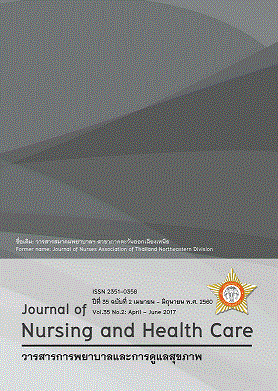การจัดการยาด้วยตนเองของผู้สูงอายุที่มีโรคเรื้อรังหลายโรคในชุมชนMedication Self-Management among Older Persons with Multimorbidity in Community
คำสำคัญ:
ผู้สูงอายุ โรคเรื้อรังหลายโรค การจัดการด้วยตนเอง การใช้ยาหลายชนิดร่วมกัน older persons, multi-morbidity, self-management, poly - pharmacyบทคัดย่อ
บทคัดย่อ
การวิจัยเชิงบรรยายนี้มีวัตถุประสงค์เพื่อศึกษาการจัดการยาด้วยตนเองของผู้สูงอายุที่มีโรคเรื้อรังหลายโรค
ปัญหา/อุปสรรค และความต้องการการสนับสนุนการจัดการยาด้วยตนเอง กรอบแนวคิดพัฒนาจากการทบทวนวรรณกรรมและประยุกต์ใช้แนวคิดการจัดการตนเองของ Lorig and Holman (2003) โดยกลุ่มตัวอย่าง คือ ผู้สูงอายุที่มีโรคเรื้อรังหลายโรคจำนวน 107 คน ในชุมชนเขตรับผิดชอบของโรงพยาบาลส่งเสริมสุขภาพตำบลแห่งหนึ่ง อำเภอภูเขียว จังหวัดชัยภูมิ สามารถพูดสื่อสารเข้าใจภาษาไทย ไม่มีภาวะซึมเศร้าและสมองเสื่อม เครื่องมือที่ใช้ในการวิจัย ประกอบด้วยแบบบันทึกข้อมูลทั่วไป แบบสอบถามการจัดการยาด้วยตนเองของผู้สูงอายุที่มีโรคเรื้อรังหลายโรค แบบสัมภาษณ์ปัญหา/อุปสรรคและความต้องการการสนับสนุนในการจัดการยาด้วยตนเองของผู้สูงอายุที่มีโรคเรื้อรังหลายโรค วิเคราะห์ข้อมูลเชิงคุณภาพด้วยการวิเคราะห์เนื้อหาและวิเคราะห์ข้อมูลเชิงปริมาณโดยใช้สถิติเชิงพรรณนา
ผลการศึกษา พบว่า การจัดการยาด้วยตนเองของผู้สูงอายุที่มีโรคเรื้อรังหลายโรค แบ่งเป็น 3 ด้าน ประกอบด้วย
1) การจัดการตนเองด้านการแพทย์เมื่อจำเป็นต้องใช้ยาหลายชนิด อยู่ในระดับมาก ( =2.85, SD = 0.44)
2) การจัดการยาด้วยตนเองด้านบทบาท อยู่ในระดับมากที่สุด ( =3.58, SD = 0.99)
3) การจัดการยาด้วยตนเองด้านอารมณ์ อยู่ในระดับน้อย ( =1.33, SD = 0.65)
ส่วนปัญหา/อุปสรรคในการจัดการยาด้วยตนเอง พบว่า ผู้สูงอายุร้อยละ 47.7 มีปัญหาการจัดการยาด้วยตนเอง
โดยผู้สูงอายุรับรู้ว่าปัญหาในการจัดการยาด้วยตนเองมากที่สุดคือ ด้านความจำ ร้อยละ 54.9 รองลงมาคือด้านการมองเห็นสี/ลักษณะเม็ดยา/ฉลากยา คิดเป็นร้อยละ 51.0 นอกจากนั้นผู้สูงอายุ ร้อยละ 43.9 ยังพบปัญหา/อุปสรรคในการไปรับบริการ/ยา สำหรับความต้องการการสนับสนุนการจัดการยาด้วยตนเองของผู้สูงอายุ ได้แก่ ต้องการผู้ให้คำปรึกษาเมื่อมีปัญหาเรื่องการใช้ยาและต้องการอุปกรณ์ช่วยจัดการยาด้วยตนเอง ร้อยละ 26.4 เท่ากัน รองลงมาคือต้องการความรู้เบื้องต้นในการใช้ยา ร้อยละ 20.9 ต้องการความสะดวกในการไปรับบริการ/ยา ร้อยละ 19.4 ผลการศึกษานี้สามารถเป็นแนวทางในการดูแลและส่งเสริมการจัดการยาด้วยตนเองสำหรับผู้สูงอายุที่มีโรคเรื้อรังหลายโรค
Abstract
The purpose of this descriptive research was to study medication self-management among older persons with multimorbidity in the community as well as their problems/barriers and needs for medication self –management support. The conceptual framework for this study was developed by the researchers combined with an application of self-management concept (Lorig & Holman, 2003). Sample included 107 older persons with multimorbidity who could communicate in Thai, without depression and dementia and resided in the community under the responsibility of the Sub-District Health Promotion Hospital in Amphoe Phukhieo, Chaiyaphum province. Research instruments included demographic data form, medication self-management questionnaires, problem/ barriers medication self-management questionnaires and need for medication self-management support questionnaire which was developed by the researcher. Descriptive statistics were used to analyze the quantitative data and content analysis was used for qualitative data. Results showed that: 1) Medical management, the practice was on the high level ( =2.85, SD = 0.44) 2) Role management was on the highest level ( =3.58, SD = 0.99) 3) Emotion management was on the low level ( =1.33, SD = 0.65). In the aspect of problem/ barriers 47.7% of multi-morbidity older persons had medication self-management problem including 1) Cognitive function problem, that was forget to take the medicine (54.9%), 2) Physical function problem, visualization to read a medicine label or pill (51.0 %). 3) Client services system problem (43.9%). The need for supporting medication self-management was the consultant concerning the medicine usage that they needed and the equipment to prepare medicine by themselves (26.4%), the basic knowledge about medicine ( 20.9%) and convenience for receiving services/medicine (19.4% ). These data can be used a guideline for caring and enhance medication self-management of older persons with multi-morbidity in community.


